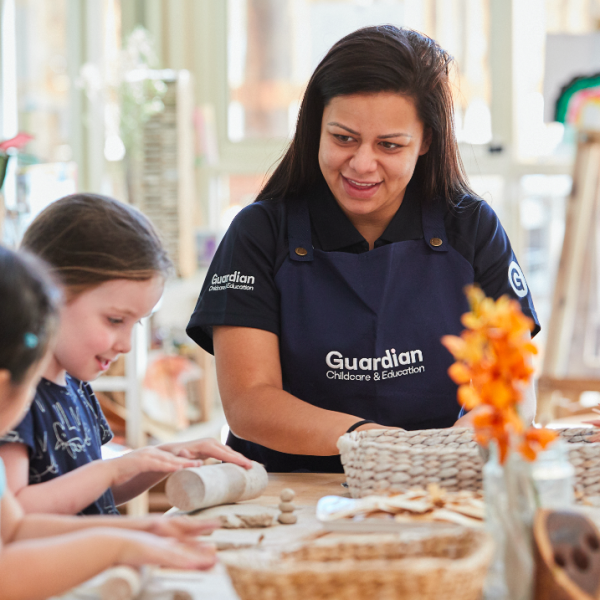The role of mentorship in supporting ECTs across the Guardian network

As Australian early childhood education and care (ECEC) services continue to struggle with attracting high quality early childhood teachers (ECTs), many providers are seeking to showcase the points of difference on offer within their services to not only fill, but retain, ECTs.
We spoke recently with the Victorian and New South Wales ECT mentors for Guardian Childcare and Education, to learn more about how mentorship is supporting the provider in its quest to manage this challenging aspect of ECEC service provision.
About the role
The teacher mentor role was created within Guardian to offer key support to ECTs working across its network. As part of the program, newly graduated teachers are paired with mentors who assist them in growing their confidence as practitioners, developing their skills, and raising their professional identity with families, and across the provider network.
As well as supporting mentees to grow within their own roles, the program aims to match “like with like” so that those ECTs across the network with common interests, such as sustainability, multiage learning, or cultural competency, are connected with one another.
Additionally, the role aims to ensure that professional development is embedded into programs, and that professional development offerings are consistent with the needs of the ECTs in the team.
Insights from mentors
When asked about some of the biggest insights gained from her 18 months as a mentor, Margie Cohen, Victorian ECT mentor, said that she came to the position at a time when having dedicated support for ECTs to help them through their registration requirements was “a rare thing.”
While her initial focus was on getting teachers through the registration process, she quickly realised that the conversations she was having were very similar – the ECTs she was working with had similar questions and wonderings.
From there, her focus shifted, as she came to the conclusion that being a mentor was not about having all the answers, but rather about creating opportunities within the network where shared learning and collaboration could take place.
For Nicky Lewis, who holds the same position in New South Wales, mentorship is a more familiar space, having joined Guardian from positions as a trainer and assessor and facilitator in the Quality Support Program with ACECQA.
Despite the familiarity of the mentoring role, she said, she is always grateful for the trust placed in her by others at the beginning of the mentor/mentee relationship.
“There is often a sense of relief when they hear I am there for them to gently guide them along the way,” she said.
“They invite me into their world from that moment, and we become partners looking at ways they can discover their own success.”
Drawn to work with others – what makes a good mentor?
When asked what drew them to their role as a mentor, both women had different motivations.
For Nicky, she has always been driven toward roles that support children experiencing quality education and care – be that through her own practice, or through her support of others.
The opportunity to support other ECEC professionals to develop their professional identity, amplify their voice and raise the collective profile of ECEC through the delivery of quality practice are also core components.
“I see this role as being pivotal to ECTs feeling supported, valued and recognised. Feeling this way impacts their level of job satisfaction, and the quality of their practice, all of which leads to better outcomes for children and families,” she said.
For Margie, being a mentor has been an opportunity for growth, and a position in which she has learnt about giving and receiving feedback, developing strong relationships, and honing in on what’s most important for teachers.
“There’s an incredible purpose behind what I do,” she said, “and there is so much for a new teacher to figure out, when it comes to learning to apply theoretical knowledge to real life contexts.”
“When they become clear in their purpose and align teaching practices that are relevant to their community and context, their confidence in contemporary teaching practice grows – it’s a joy to witness.”
Advice for those wishing to start a mentor program
Margie and Nicky have the following advice for other providers who are wishing to develop a mentor program within their service/s:
- Knowledge is good, but it’s about relationships first: The best mentors are those who get to know the ECTs they are working with deeply, and those who support them to develop strong connections with a professional network, as well as the children and families they are working with.
- Two ears, one mouth: listening, relating to and understanding what the mentee would like to know or learn is more important, the mentors said, than imparting mentor knowledge straight away.
– Building capacity, encouraging ownership: mentoring, the pair note, is
about finding a balance between knowing when to provide advices, and
when to invite the mentee to seek solutions for themselves.
Further insights about mentoring in ECEC can be found in this piece, or on the ACECQA website, here.
Popular

Workforce
Policy
Quality
Practice
Provider
Research
ECEC must change now, our children can’t wait for another inquiry
2025-07-02 07:47:14
by Fiona Alston

Practice
Provider
Quality
Workforce
Leading with Curiosity: How distributed leadership is redefining the future of early childhood education
2025-07-03 07:42:07
by Contributed Content

Events News
Workforce
Marketplace
Practice
Quality
Provider
Research
An exclusive “Fireside Chat” with ECEC Champion Myra Geddes
2025-07-01 11:25:05
by Fiona Alston












